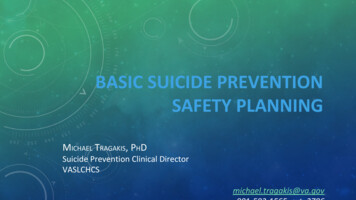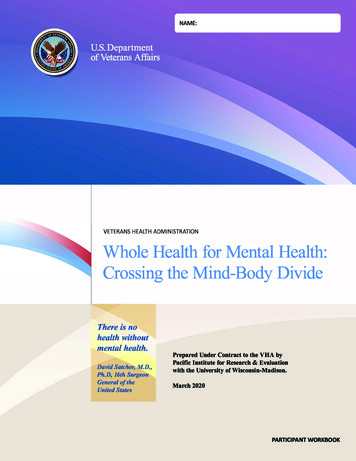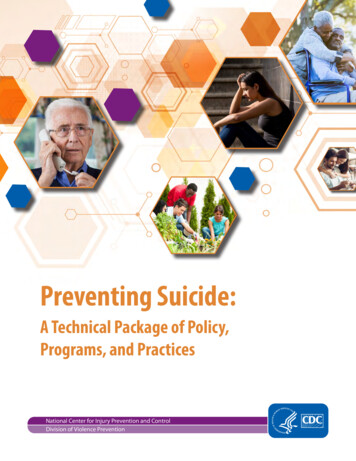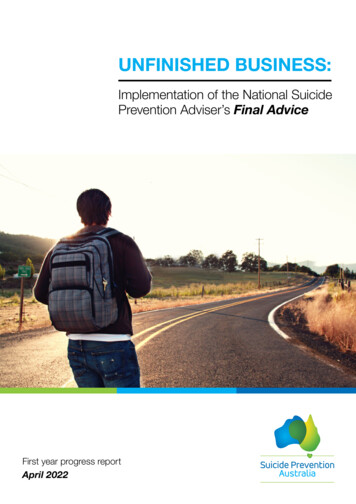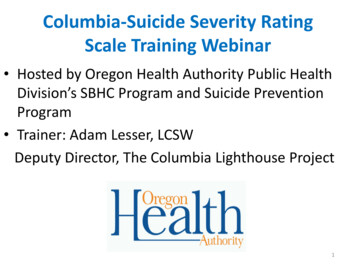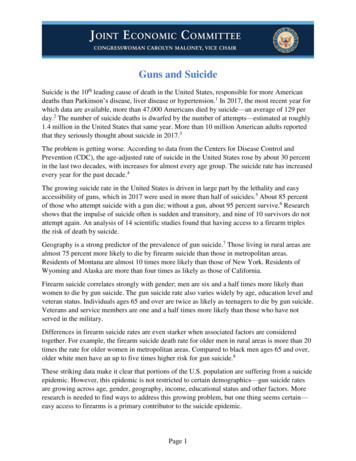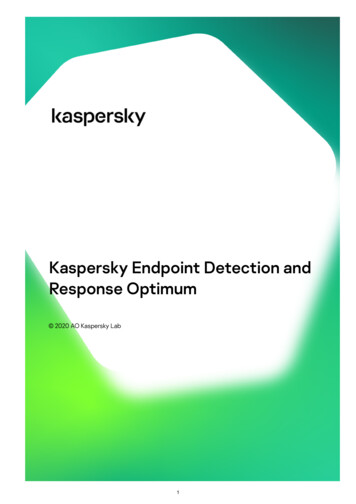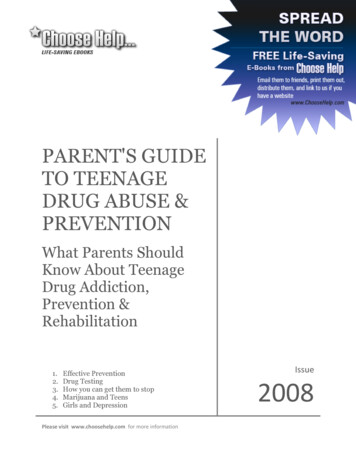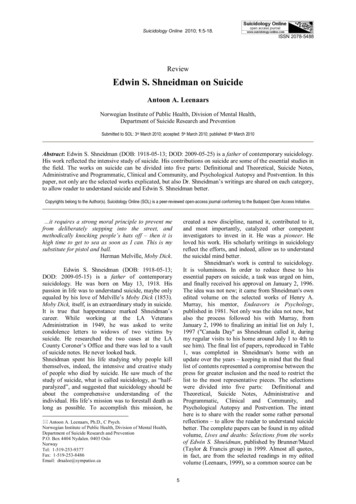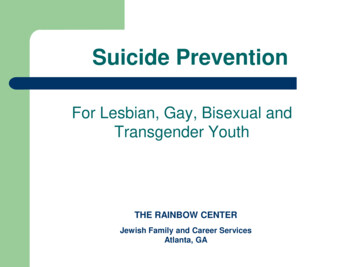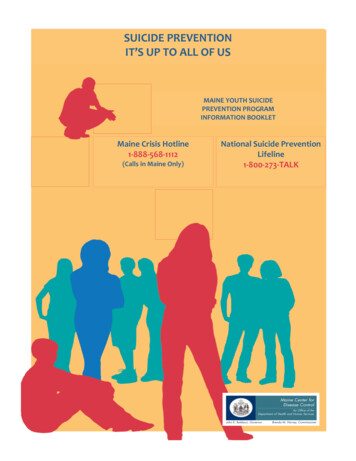
Transcription
SUICIDE PREVENTIONIT’S UP TO ALL OF USMAINE YOUTH SUICIDEPREVENTION PROGRAMINFORMATION BOOKLETMaine Crisis Hotline1-888-568-1112(Calls in Maine Only)National Suicide PreventionLifeline1-800-273-TALK
ContentsFacts . 1Warning Signs of Suicide .2Responding to Suicidal Behavior. 3Talking About Suicide 5Save a Life: Remove Lethal Methods . 7A Note About Depression . 8How to Use the Maine Crisis Hotline . 9What Puts Someone at Risk for Suicide . 10What Helps Protect Against Suicide . 11Voices of Experience . 12If a Youth Makes a Suicide Attempt. 13If Someone Dies by Suicide . 14Where to Get Help . 14Maine Suicide Prevention Resources. 15National Suicide Prevention Websites . 16Have the Courage to Get Involved . 17You Can Help Prevent Suicide . 18Printed by the Maine Department of Health and Human Services, Maine Center for Disease Controland Prevention, Maine Injury Prevention Program with funding from the Substance Abuse andMental Health Services Administration, Appropriation Number 013-10A-2602-03Maine Crisis Hotline: 1-888-568-1112
Facts About Teen Suicide and How You Can HelpThe FactsEach year in Maine, about 18 youth ages 10-24 die by suicide. Most are male. Most dieas a result of guns or hanging.For every youth who dies by suicide, about 100 or more make an attempt.In a 2007 Maine survey, almost 1 out of 9 high school youth said they had thoughtseriously about suicide.How You Can HelpYouth in pain often go to people they know for help.Be aware of extreme distress in youth. Know the warning signs of suicide. See pages 2-3Take it seriously if a youth talks about him/herself. Stay with the person.Call the statewide hotline or get other help.Find more about how to help on pages 4-11.Suicide prevention is up to all of us!Maine Crisis Hotline: 1-888-568-11121
Warning Signs of SuicideWarning signs are things you can see or hear that tell you someone may be suicidal. If you seeor hear any of these signs, act quickly.Take immediate action. Call the Maine Crisis Hotline1-888-568-1112 if:Someone makes a threat to kill themselves such as:I wish I were dead.If such and such does not happen, I will kill myself.What is the point of living.Someone is looking for a way to carry out a suicide plan.They are looking for a gun, pills or another way to kill themselves.They have a plan about where they can get these things.Someone is talking or writing about death or suicide in:Text messages.Social networking sites.Poems, music.DO NOT LEAVE THE PERSON ALONE!Call 911 if:A suicide attempt has been made.A weapon is present.The person is out of control.Get a professional to help if you notice any of the following:Signs of DepressionMood - sad, irritable, angry.Withdrawing from friends, family, activities.Changes in sleep, appetite or weight.Hopelessness - sees no chance of improvement.Feeling worthless or guilty.Not able to think or focus.11Anxiety Restlessness, agitation, pacing.Feeling like a burden “people would be better off if I were dead”.Alcohol or Drug use is increased or excessive.Maine Crisis Hotline: 1-888-568-11122
Warning Signs of Suicide, continuedFeeling trapped with no way out of the situation.Neglecting appearance.Drop in grades or increased school absences.These are signs that something is wrong and that help is needed.“I couldn‟t sleep or eat and was nervous all the time. I couldn‟t concentrate at school. Sometimes Iwould blow up at people and I never was like that before. I thought it was everyone else‟s fault. Myfriends noticed the change and told my mom. She called the crisis hotline and they helped her find acounselor who was able to help me. I‟m doing better now.”Responding to Suicidal BehaviorThree Steps to Help a Suicidal Person1. Show you care.Listen carefully, remain calm, do not judge.“I am concerned about you . . . about how you are feeling.”“You mean a lot to me, I want to help.”2. Ask about suicide.Be direct and caring.“Are you thinking about killing yourself?”“When people are in as much pain as you seem to be, they sometimes think aboutsuicide. Are you thinking about suicide?”3. Persuade the suicidal person to get help. Make sure they get help.Never leave a suicidal person alone.“I know where we can get some help.”“I will go with you to get help, you’re not alone.”If you believe a person might be in danger of suicide, it is up to you to see that they get the helpthey need. Call the statewide crisis hotline (1-888-568-1112) or the police (911) to keep theperson safe if needed.Maine Crisis Hotline: 1-888-568-11123
Responding to Suicidal Behavior, continuedIt is important to get a suicidal person help so they:Know that hope exists.See other options.Get needed help.Get through their crisis without harm.Mr. Bell: Chris, you don’t seem yourself today. Are you OK?Chris:I’m tired of everybody wanting me to be perfect, tired of doing what other peoplewant me to do and just tired of my life! What’s the point?Mr. Bell: Have you talked with your parents about how you feel?Chris:They don’t care how I feel. They’re just trying to live their lives through me. Ican’t talk to them. I’ve had it.Mr. Bell: Chris, I’m worried about you. You sound really desperate. Are you thinkingabout suicide?Chris:Maybe, I can’t keep doing this anymore.Mr. Bell: Look, I really care about you. There are other ways to solve your problems. Letme help you out. Let’s go see Ms. Smith. I know she has helped other studentswho were having a really hard time. Let’s walk over right now. I’ll come withyou.Chris:Well I guess so. If you think she can help I’ll give it a try.Maine Crisis Hotline: 1-888-568-11124
Talking About SuicideUnderstand Your FeelingsThe issue of suicide often produces strong emotions of fear, anger and disbelief.Hearing a person talk about suicide may make you overreact or not react at all. You may feelthat the person is just talking about suicide as a way of getting attention.Being mad, instead of understanding, may make the situation worse. Ignoring the threat ofsuicide does not make it go away. Not everyone feels comfortable talking with a suicidalperson. If you do not feel that you can address the issue, find someone who can.“I was really scared to ask one of my students if he was thinking about suicide, but I learnedthat this is the best thing to do. He actually seemed to be relieved that someone understoodhow badly he felt and wanted to help him.”“I practiced asking about suicide with other teachers and I just couldn’t seem to do it. So theteam decided that if I was concerned about a student I would tell the student that I wasworried about them and I would go with them to see the guidance counselor.”Asking about suicide does not increase the risk of suicide. It is very important to ask if you areconcerned about someone. The fact that you ASK about suicide is much more important thanhow you ask. When someone talks about suicide, it must be taken seriously.How to do it:Listen with your full attention, take your time, be patient.Speak slowly, softly, calmly.Do not ignore the pain.Reassure, be positive.What to do:Name people the person trusts for support and help.Make a plan for getting help, building hope.Know your limits. Do not be the only person giving support.What is not helpful:Acting shocked or angry.Interrupting.Offering advice.Minimizing the problem.Saying “I know how you feel”, “if you only tried harder” or “you’re joking, right?”Maine Crisis Hotline: 1-888-568-11125
Talking About Suicide, continuedKeep everyone safe:Never ignore the behavior.Never agree to keep a secret.Never leave a person alone if you think they are not safe.Never try to forcefully remove a weapon.Buddy Talks to RayBuddy: Hey man, you really looked messed up last night, how’s the head this morning?Ray:Kind of thick; I don’t remember seeing you at all.Buddy: I’ve gotta tell you, you scared me with some of the stuff you said; that’s why I tookyour car keys. I’m really worried about you.Ray:Don’t be, I was just ticked at DJ; he’s always on me. On top of that Emily dumpedme. I don’t know how much more I can take.Buddy: Hey, we need to look after you. With what you said and the way you were actinglast night, I don’t know are you thinking of killing yourself?Ray:What if I am? It’s none of your business.Buddy: Yes it is, I care about you Ray. I feel you’re in trouble and I want to help you.Ray:It’s not on you, I just need some time to get my head straight.Buddy: Don’t do it man. We’re gonna get you some help. The coach helped some other kidI heard about. Let’s talk to him right now. Let’s go.Maine Crisis Hotline: 1-888-568-11126
Save a Life: Remove Guns or Other Lethal MethodsAccess to lethal means for a suicidal person can be deadly. Removal of guns, pills, ropes, etc.from the home of a person in crisis saves lives. It gives the suicidal person time to get help.Think of this in the same way as keeping the car keys away from someone who has beendrinking.Firearms are the most common method of all youth suicides. Other leading methods arehanging and poisoning.Research shows the risk of suicide doubles when a gun is in the home of a suicidal person.Alcohol and drugs can cause people to act without thinking.Medication can be used in a suicide attempt.What can you do to help protect a suicidal person?Remove access to all types of guns if it is safe to do so.Many police departments will take temporary possession of guns from people during acrisis. Check with police about gun locks or disposal of guns. Never bring a gun to thepolice; call and ask for assistance.Remove any items that could be used for hanging.Lock up all pills, drugs and alcohol. For more information call the Poison Center: 1-800222-1222While these things can help, it is not possible to completely suicide proof a home. If you areworried that someone is suicidal call the crisis hotline.Maine Crisis Hotline: 1-888-568-11127
A Note About DepressionDepression is a treatable medical illness. Most suicidal people suffer from depression tosome degree. Depression often comes on slowly and can go undiagnosed until a crisisoccurs. It is a leading risk factor for suicide.Depression may leave a person feeling “too tired” to carry out a suicide plan. Whendepression begins to lift, this might be a very dangerous time because the person has theenergy to act on suicidal thoughts.A doctor should be seen about any of these signs, especially if they have lasted for 2 weeks ormore.Signs of Depression Include:Depressed mood-sad, tearful, or irritable.Loss of interest or pleasure in life.Withdrawing from family and friends.Sleeping too much or too little.Change in weight or appetite.Inability to think or concentrate, confused.Feeling hopeless, worthless, guilty.Thinking about death or suicide.Maine Crisis Hotline: 1-888-568-11128
How to Use the Maine Crisis HotlineIf you are worried about someone you can call the Maine Crisis Hotline 24 hours a day, 7 daysa week. A trained counselor will provide help.It is free.The person calling does not have to give their name.The information discussed with the crisis worker will not be shared unless someone’s safetyis at risk.A person does not have to be suicidal to call the crisis hotline. Anyone can call to askquestions if they are worried about someone.What to Expect:The crisis worker will ask what is going on and ask about everyone’s safety to help figureout what kind of support is needed.If more help is needed, a face to face meeting with the crisis worker will be set up.A safe place for this meeting will be discussed. This could be the person’s home, the crisisoffice, the school, or the emergency room.The face to face meeting will decide what type of help is needed.Crisis workers can give guidance and referral information.The goal of calling the crisis hotline is to get the person the help they need to safely stay athome or in their community.Maine Crisis Hotline: 1-888-568-11129
What Puts Someone at Risk for Suicide?Many things can increase someone’s risk for suicide. Risk factors are things that happened inthe past or are happening now that cause stress and make it hard to cope.Suicide is not caused by just one thing, Risk factors affect everyone in different ways.Risk factors linked with suicidal behavior are:One or more suicide attempts (strongly linked to future suicide risk).Mental illness.Exposure to other suicides.Access to firearms or other lethal means.Loss of any kind.A history of abuse or trauma.Other common risks factors are:Acting on impulse.Bullying and harassment.Alcohol and substance abuse.Lack of coping or problem solving skills.Maine Crisis Hotline: 1-888-568-111210
What Helps to Protect Against Suicide?Protective factors are the positive things in someone’s life that reduce the potential of suicideand other high-risk behaviors. For youth, protective factors can be:Coping Skills and Personal TraitsDecision making, anger management, conflict resolution, problem solving and other skills.A sense of personal control.A healthy fear of risky behavior and pain.Hope for the future.ConnectionsReligious/spiritual beliefs about the meaning and value of life.Positive relationships with family, friends, school, or other caring adults.Responsibilities at home or in the community.Health and HomeA safe and stable environment.Not using drugs and alcohol.Access to health care.Taking care of self.Maine Crisis Hotline: 1-888-568-111211
Voices of Experience1. People who die by suicide often say something about it first.Most people who die by suicide have talked about their plans with at least one person.“. always ask, always keep it in the back of my mind, be sure to have those resourcesavailable, and never, never underestimate the signals that are coming through or potentialsignals.”a Maine guidance counselor2. There are warning signs that show someone may be suicidal. Ask about suicide.There are almost always warning signs. Learning the signs and how to help may save a life.“ but there are definitely more subtle messages that kids give. Just the ability to becomfortable with saying the word suicide is important. Know that the person is probablyrelieved to hear that someone is asking them if they are suicidal. They might feel that noone else is seeing what‟s really going on inside of them ”a Maine teacher and social worker3. Anyone who threatens suicide should NOT be ignored even if it seems the person istrying to manipulate others.All suicide threats must be taken seriously. This behavior may be a sign of depression andprofessional help is needed. Threats are a cry for help.“.the biggest thing is not to ignore anything. Don‟t just brush it off if they say, „I think I‟mgoing to kill myself‟ and they say „Oh, I‟m only kidding.‟ Don‟t just brush it off.”a Maine teacherMaine Crisis Hotline: 1-888-568-111212
If a Youth Makes a Suicide Attempt Offer Support to Parents andOthersIt is important to get help for the family of a suicidal youth. The family may be confused ordistressed. They should not have to face the struggle alone. A team can help. This can includemedical professionals, the local crisis agency, professional counselors, clergy, schools and othermembers of the community.Parents and family members may be:Feeling that their world has been turned upside down.Feeling fear, shame, anger, denial.Wishing for life to get “back to normal”.Parents and family members may need support to:Get professional help.Identify personal coping skills and support systemsSee pages 17 - 19 for helping resources.Understand the importance of removing guns and other lethal methods from the person’sreach.Support friends:Friends will also be feeling many strong emotions.Listen, show you care and let them know about resources at school and in thecommunity.Learn more about supporting parents and friends through training from the Maine YouthSuicide Prevention Program and other resources listed at the end of this booklet.Remember that it is never too late for someone to ask for help.Maine Crisis Hotline: 1-888-568-111213
If Someone Dies by SuicideIf a suicide happens, it brings a kind of grief that may include shock, denial, disbelief, guilt andshame. It is important to acknowledge the loss with the family. Listening and showing thatyou care are very important. Local counseling agencies can help.Grief Support ResourcesTo find a grief support group for adults or children in your area, call your local or regionalhospice or go to the survivor section of www.mainesuicideprevention.org.Where to Get HelpAvailable 24 Hours a Day911 - If a suicide attempt has been made, a weapon is present or if the person is out ofcontrol.1-888-568-1112 - Statewide Crisis Hotline is answered by people trained to assess suiciderisk.1-800-273-TALK (8255) - National Suicide Prevention Lifeline call from anywhere in theUS. Includes a hotline for Veterans.Local Hospital Emergency Room1-800-222-1222 - Poison Control Center gives information and treatment advice forpoison emergencies.To Find Local Helping Resources211 - Maine Resource Directory gives information on services, counseling, medical helpand support groups.In the Community:Crisis service agencyMental health providerPrimary care physicianFaith-based contactAt School:Maine Crisis Hotline: 1-888-568-111214
Maine Suicide Prevention ResourcesFor training, education and resources in MaineMaine Youth Suicide Prevention Program (MYSPP)The MYSPP provides training, education and resources on youth suicide prevention. MYSPP isa partnership led by the Maine Center for Disease Control and Prevention (MeCDC) in theDepartment of Health and Human Services (DHHS). Other state agency partners are theDepartments of Education, Public Safety, Corrections and Labor. Contact us to learn more:1-800-698-3624 / TTY: 1-800-606-0215www.mainesuicideprevention.orgFor free copies of this bookletInformation Resource Center (IRC)The IRC gives free copies of this booklet and other resources on youth suicide prevention. TheIRC is part of the Maine Office ofSubstance Abuse.1-800-499-0027 / TTY: For information and support about mental illnessNational Alliance on Mental Illness (NAMI Maine)NAMI Maine has a statewide education and advocacy program on issues relating to mentalhealth. Call for information on training programs, information network or local support groupsfor families and persons with mental illness.1-800-464-5767www.namimaine.orgMaine Crisis Hotline: 1-888-568-111215
National Suicide Prevention WebsitesSuicide Prevention Resource Center (SPRC)SPRC provides prevention support, training, and resources to assist organizations andindividuals to develop suicide prevention programs, interventions and policies.http://www.sprc.orgAmerican Association of Suicidology (AAS)AAS has resources and information on suicide, suicide prevention and the needs of those whohave lost a loved one to suicide. AAS offers these services to people, organizations andschools.http://www.suicidology.orgAmerican Foundation for Suicide Prevention (AFSP)AFSP provides information to family and friends who have lost someone to suicide. Its missionis to prevent suicide through research and education.http://www.afsp.orgMaine Crisis Hotline: 1-888-568-111216
Have the Courage to Get Involved“Unless you have been throughthe suicide of a youth who was closeto you, it’s difficult to fully understandthe devastation and suffering causedby this loss to family, friends,classmates, and community members.”parent who lost a child to suicide“I was so tired of the pain.the struggle, Ijust couldn’t do it anymore. My friendreally heard me and helped me get thesupport I needed.”someone who made a suicide attempt“Young people who are suicidal are in pain and they need help. Remember to show them youcare, ask them if they are thinking about suicide and get them help. Learn more about suicideprevention and have the courage to get involved.”Maine Youth Suicide Prevention ProgramMaine Crisis Hotline: 1-888-568-111217
YOU can help prevent suicideIn Maine, a young person (ages 10-24) dies by suicide about everytwo and one half weeks.Learn the warning signs for suicide.Take action - 3 steps to save a life.1. Show you care. Listen and express concern.“I’m worried about you ”2. Ask about suicide. Be direct in a caring way.“Are you thinking about suicide?”3. Get help. Do not leave the person alone.“Let me help you.”Suicide prevention is up to all of usMaine Crisis Hotline: 1-888-568-111218
Warning Signs of SuicideSomeone makes a threat to kill themselvesSomeone is looking for a way to carry out a suicide planSomeone is talking or writing about death or suicideTake action, call the Maine Crisis Hotline: 1-888-568-1112DO NOT LEAVE THE PERSON ALONE!In an Emergency, CALL 911If someone attempts suicideA weapon is presentIf the person is out of controlDon’t be afraid. Making the call may save a life.Caring.Responsive.Well-Managed.We are DHHSThe Department of Health and Human Services (DHHS) does not discriminate on the basis of disability, race, color, creed, gender, sexualorientation, age, or national origin, in admission to, access to, or operations of its programs, services, or activities, or its hiring or employmentpractices. This notice is provided as required by Title II of the Americans with Disabilities Act of 1990 and in accordance with the CivilRights Act of 1964 as amended, Section 504 of the Rehabilitation Act of 1973, as amended, the Age Discrimination Act of 1975, Title IX ofthe Education Amendments of 1972 and the Maine Human Rights Act and Executive Order Regarding State of Maine Contracts for Services.Questions, concerns, complaints or requests for additional information regarding the ADA may be forwarded to DHHS’ ADA Compliance/EEO Coordinators, 11 State House Station, 221 State Street, Augusta, Maine 04333, 207-287-4289 (V), 207-287-3488 (V), 1-800-606-0215(TTY). Individuals who need auxiliary aids for effective communication in program and services of DHHS are invited to make their needs andpreferences known to the ADA Compliance/EEO Coordinators. This notice is available in alternate formats, upon request.
Buddy: I’ve gotta tell you, you scared me with some of the stuff you said; that’s why I took your car keys. I’m really worried about you. Ray: Don’t be, I was just ticked at DJ; he’s always on me. On top of that Emily dumped me. I don’t know how much more I can take. Buddy: Hey,
